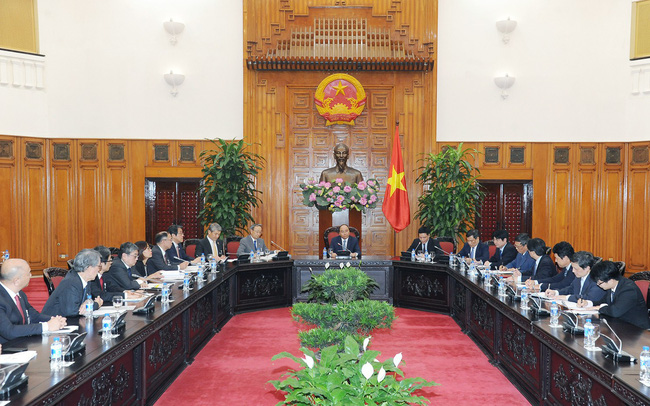PM Phuc lauds Keidanren’s great contributions to Vietnam-Japan ties
- PM Phuc hails Japan’s investment promotion in Vietnam
- PM Phuc hopes for stronger economic and trade links with Algeria
- PM Phuc stresses the need to prevent bad elements from inciting people
On July 31, Prime Minister Nguyen Xuan Phuc hosted a reception in Hanoi for two Keidanren Co-Chairs, Kuniharu Nakamura and Hideo Ichikawa, and Keidanren delegation members, during which he praised the substantial and effective bilateral relations based on the extensive strategic partnership.
He said Japan is currently Vietnam’s second largest official development assistance (ODA) sponsor and second largest foreign investor, while also ranking third amongst foreign travelers to Vietnam. He said he hopes that Keidanren will redouble its efforts to promote Japan’s first place in all those fields.
Highlighting Japan’s role and coordination with Vietnam towards accelerating the signing of the Comprehensive and Progressive Agreement for Trans-Pacific Partnership (CPTPP), the Vietnamese government leader said Vietnam will ratify the pact by the end of this year, and hopes to accompany Japan in expediting the implementation of the trade deal.
 |
| PM Phuc lauds Keidanren’s great contributions to Vietnam-Japan ties |
Phuc said Vietnam always regards the East Asian country as one of its leading partners, and hopes that both sides would augment cooperation across multiple sectors for the sake of the two peoples, and for regional and global peace and prosperity.
The Vietnamese Government and people wish that Japanese businesses will enhance their prestige, and increase long-term, sustainable investment in the country. As both nations boast huge potential for further collaboration, the Vietnamese Government will offer the best possible conditions for Japanese businesses in the spirit of mutual benefit, he noted.
PM Phuc expressed hope that the Japanese side will provide its continued support for Vietnam in the nation’s socio-economic development process, especially in the fields of its most demand, such as agricultural machinery, oil and gas, automobile engineering, energy, processing and manufacturing, and infrastructure development.
Apart from economic and trade cooperation, Vietnam is keen to strengthen people-to-people and cross- cultural exchanges with Japan. Vietnam backs Japan’s cooperation activities within the framework of collaboration programmes with the Mekong Sub-region countries, he said.
He suggested the two Keidanren Co-Chairs and Keidanren delegation members accelerate their implementation of the Vietnam-Japan Joint Initiative to maintain policy dialogue mechanisms between the Vietnamese Government agencies and Japanese enterprises while describing this as an effective channel for Vietnamese authorities to revamp regulations and policies to ameliorate the business climate.
In turn, Kuniharu Nakamura said he is happy to witness the growing Vietnam-Japan Extensive Strategic Partnership, noting that high-level exchange visits have helped to foster the friendship and comprehensive cooperation between the two countries. Vietnam is viewed as an attractive market for Japanese enterprises as a result of its large population, stable socio-political environment, as well as its role as a gateway for Japan to explore the ASEAN market.
Last year, Vietnam drew the largest amount of Japanese investment from more than 1,700 businesses with US$ 9.1 billion. Japan will intensify investment in Vietnamese infrastructure and human resources.
For the time ahead, Keidanren will increase its granting of scholarships for Vietnamese students, he told his host.
For his part, Hideo Ichikawa said that Keidanren also desires to help Vietnam better its business climate through the implementation of the Vietnam-Japan Joint Initiative, currently in its seventh phase.
He said he hopes to receive more support from the Vietnamese authorities in carrying out the initiative.
About the significance of infrastructure development in the context of keeping the ceiling ratio of public debt in check, he suggested the Vietnamese Government choose rational projects under the public-private partnership (PPP) model and assured Japanese businesses’ readiness to engage in such projects in the Southeast Asia.

